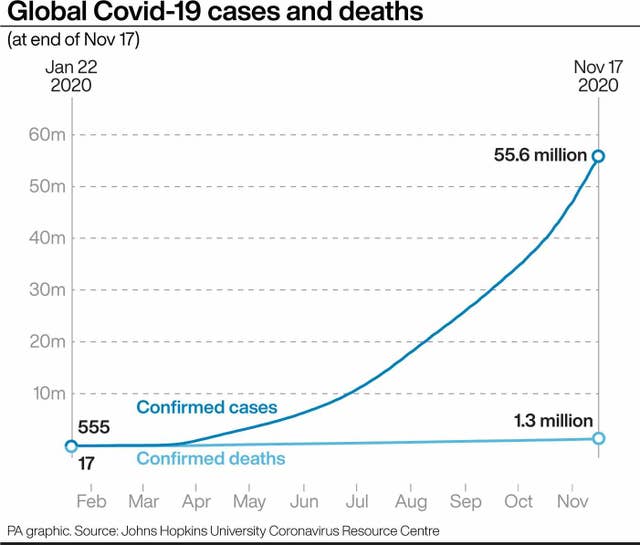
Ian Payne 4am - 7am
18 November 2020, 15:54

Europe made up almost half of the world’s four million new coronavirus cases last week, according to the World Health Organisation.
The European Commission has asked EU member states to generalise the use of rapid antigen tests as winter approaches and Europe struggles to contain a second wave of coronavirus infections.
Antigen tests are less reliable than the standard PCR coronavirus tests, but they cost less and help track-and-tracing efforts due to producing results more quickly.
In its non-binding recommendation, the European Commission encouraged the 27 EU countries to use a common set of Covid-19 tests, a move aimed at slowing infections while facilitating cross-border travel during the pandemic.
The hard-hit aviation industry has been pushing for the implementation of rapid tests for air passengers to reduce the need for post-arrival quarantines and to give airlines a boost.
“To slow down the spread of coronavirus, we need to scale up testing,” European Commission president Ursula von der Leyen said.
The commission said it is allocating 100 million euros (£89 million) to purchase rapid antigen tests and to deliver them to EU member states. In addition, it plans to allocate 35.5 million euros (£31.5 million) to the International Federation of Red Cross and Red Crescent Societies for staff training and equipping the humanitarian network’s testing teams.
The European Commission said rapid tests should be used in situations where fast detection is needed to manage an outbreak or for the regular surveillance of high-risk groups and locations, such as medical personnel and in care homes.

The commission also recommended the use of the tests for the purpose of deciding in what order patients should be treated at healthcare facilities.
When PCR tests are not sufficiently available in areas where the proportion of positive cases is greater or equal to 10%, the rapid tests should be used to test people with Covid-19 symptoms, the commission said. They also could be used in locations with a lower proportion of positive cases as part of contact-tracing strategies.
The proposal came as World Health Organisation (WHO) figures showed Europe made up almost half of the world’s four million new coronavirus cases last week, although the continent did record a nearly 10% fall in infections compared to the week before.
The latest weekly tally from the UN health agency found its 54-nation European region continued to report most new cases of any region worldwide with 46%, but its decline in cases followed “the strengthening of public health and social measures”.
As new cases fell, however, the tally of virus deaths still rose “substantially” over the last week to more than 29,000 new deaths.
The WHO said the sharpest rise in coronavirus cases was in Austria, which saw a 30% increase in new cases compared to the previous week.
Pockets of western Europe have shown signs of turning a corner, particularly in the lowlands near the English Channel.

Belgium said on Wednesday it had taken a major step in containing the resurgence of coronavirus, reporting a drop in the daily death count for the first time since the latest Covid-19 wave hit this autumn.
Virologist Steven Van Gucht, from the government’s Sciensano health group, said Belgium’s daily average of virus deaths now stood at 185, a 5% decrease compared to the average a week ago. Over the last week, the daily average of hospital admissions dropped 24% and new infections fell 39%.
Officials in the Netherlands were easing coronavirus restrictions amid falling infection rates and were poised to reopen venues like cinemas, museums, libraries, zoos and swimming pools – still with limitations on how many people can visit – after a two-week closure.
Switzerland, which has registered some of the highest transmission rates in the world in recent weeks, on Wednesday stepped up government support to help people affected by the virus and by lockdown measures – including a extra billion Swiss francs (£825 million) in state aid – even as case counts eased back from recent peaks.
The country counted over 6,000 new cases over the last day, down from a peak of more than 10,000 daily cases in October.
Regional officials in Geneva noted a “plateau” in positive Covid-19 tests in recent days and on Wednesday eased some restrictions on hairdressers, tattoo parlours, therapists and personal trainers, among others.
Europe has seen over 338,000 confirmed virus deaths in the pandemic, according to a tally by Johns Hopkins University.